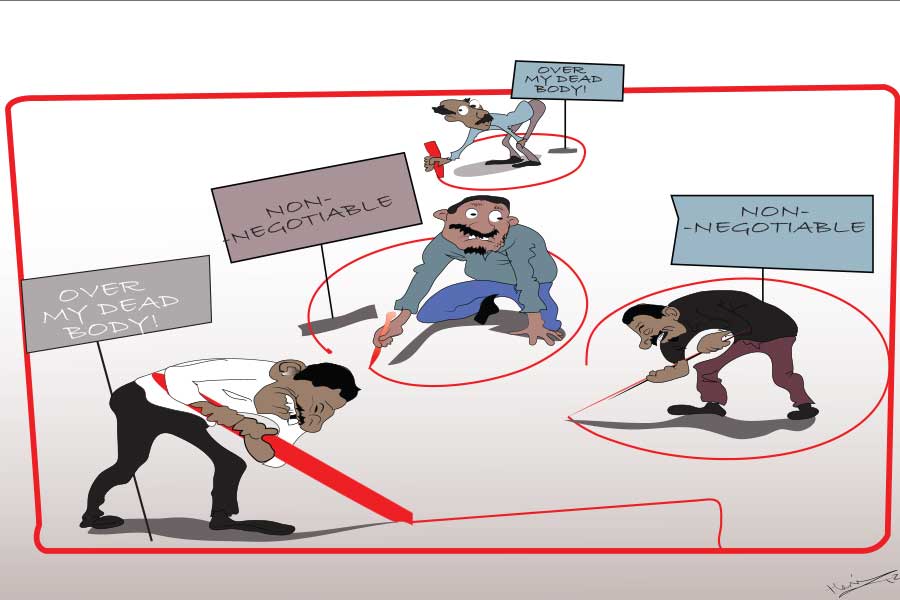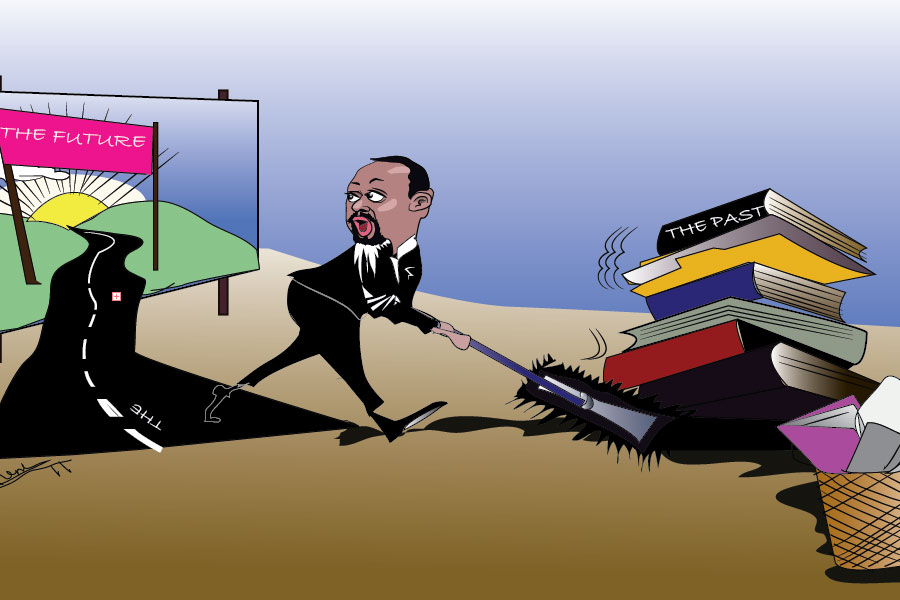
Editorial | Feb 20,2021
Jan 5 , 2019
By Hintsa Andebrhan
Politics is complicated, and geopolitics even more so. Every nation has an agenda in relation to its own sovereign interests, and more often than not in the grand game of geopolitics, despite the multilateral institutions that were created to protect against the lack of balance, it is the small nations that most lose out.
It is thus necessary to note that many of the complications that we see in the world today have their roots in the interests that big powers around the world, sometimes unfairly, want to secure. It is also the middle powers that step on the necks of poor nations just as painfully as the big ones step on them.
In an article in this publication headlined, “The Moral Imperative to Stand by Eritreans” [No. 970, Vol. 19, December 2, 2018], the author argued that Ethiopians should look beyond the rapprochement with Eritrea and demand a political opening in the small Horn country.
"The lifting of the sanction against Eritrea by the United Nations Security Council was seen as a reward for rapprochements with neighbouring countries and a vindication of the allegations of supporting radical terrorist groups in Somalia," was how the article began.
It was more than a vindication. Eritrea was innocent in that subsequent whistleblower accounts show that the sanctions leveled against the nation had little to do with the situation that followed tensions with neighbouring Djibouti.
It is also very hard to believe that the lack of evidence for the alleged support given to Somalia were the reasons for the lifting of sanctions. It was all a grand game of politics, which like always a small nation was forced to pay the price for. It was a leak by WikiLeaks that most justifies this view.
“[Ambassador Susan] Rice advised the group to reach agreement on a specific package of measures and counselled that the initiative would be more viable in the [United Nations Security] Council, if packaged as an African consensus proposal rather than one driven by Eritrea's estranged neighbours Ethiopia and Djibouti,” it read.
It gives a crucial insight into the set of decisions that went into the vote to put sanctions on Eritrea at the time, and show that they were partisan, lacking the necessary fair play before any nation is condemned to economic disenfranchisement.
To give credit where credit is due to Rice, she urged Washington, the administration of former President Barack Obama, to try and reach a settlement with the Eritrean government, then and now under Issayas Afeworki’s leadership. But this does not excuse from the fact that the United Nations was used as a tool to force the hand of a government, an incursion to the principles of the intergovernmental institution.
The sanctions against Eritrea that were lifted by the Security Council after nine years should never be seen as a reward for its rapprochement with Eritrea for investigations have cleared the country of its alleged support for radical groups in Somalia. It should be considered a corrective measure for the injustice that was committed against it.
The border dispute with Djibouti could not have been a reason for sanctions on its own, as there is no clear agreement to solve it as of yet. Indeed, it was a problem that could have been resolved between the two countries, at the most with support from the rest of the members of the region.
Of course, although I prefer to see the lifting of the sanctions as righting past wrongs, it too has a great deal to do with geopolitics. It follows a reorientation in foreign policy by President Donald Trump’s administration toward the region, with there being a consensus that the measure was taken to counter China’s influence in the region and empower Middle Eastern powers it supports.
I agree with the opinion piece that Eritreans deserve democratic rights and should be able to enjoy its fruits, such as elections and free speech, and that the government should put that on the table for its people.
There is a reason to believe that this could happen now as the political situation in the country before the unfortunate and, in retrospect, unnecessary Ethio-Eritrea War was very different. Working as a journalist back then, I was witness to the positive developments in the country, which led to the drafting of the constitution.
Eritrea has walked the harsh path to get to this point, biding its time until the political undercurrents turned to its favour. It kept its sovereignty, and gradually, it should begin strengthening its democracy.
PUBLISHED ON
Jan 05,2019 [ VOL
19 , NO
975]


Editorial | Feb 20,2021

Commentaries | Mar 14,2020

Editorial | Nov 13,2021

My Opinion | Feb 20,2021

Editorial | Jan 04,2020

Viewpoints | Mar 16,2019

Editorial | Feb 01,2019

Editorial | Dec 04,2020

My Opinion | Jun 20,2020

My Opinion | May 08,2021

My Opinion | 131969 Views | Aug 14,2021

My Opinion | 128359 Views | Aug 21,2021

My Opinion | 126296 Views | Sep 10,2021

My Opinion | 123912 Views | Aug 07,2021

Dec 22 , 2024 . By TIZITA SHEWAFERAW
Charged with transforming colossal state-owned enterprises into modern and competitiv...

Aug 18 , 2024 . By AKSAH ITALO
Although predictable Yonas Zerihun's job in the ride-hailing service is not immune to...

Jul 28 , 2024 . By TIZITA SHEWAFERAW
Unhabitual, perhaps too many, Samuel Gebreyohannes, 38, used to occasionally enjoy a couple of beers at breakfast. However, he recently swit...

Jul 13 , 2024 . By AKSAH ITALO
Investors who rely on tractors, trucks, and field vehicles for commuting, transporting commodities, and f...

Jul 5 , 2025
Six years ago, Ethiopia was the darling of international liberal commentators. A year...

Jun 28 , 2025
Meseret Damtie, the assertive auditor general, has never been shy about naming names...

Jun 21 , 2025
A well-worn adage says, “Budget is not destiny, but it is direction.” Examining t...

Jun 14 , 2025
Yet again, the Horn of Africa is bracing for trouble. A region already frayed by wars...

Jul 6 , 2025 . By BEZAWIT HULUAGER
The federal legislature gave Prime Minister Abiy Ahmed (PhD) what he wanted: a 1.9 tr...

Jul 6 , 2025 . By YITBAREK GETACHEW
In a city rising skyward at breakneck speed, a reckoning has arrived. Authorities in...

Jul 6 , 2025 . By NAHOM AYELE
A landmark directive from the Ministry of Finance signals a paradigm shift in the cou...

Jul 6 , 2025 . By NAHOM AYELE
Awash Bank has announced plans to establish a dedicated investment banking subsidiary...